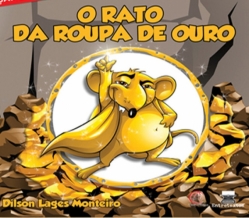Animais na heráldica (V)
 Por Flávio Bittencourt Em: 01/12/2009, às 15H31
Por Flávio Bittencourt Em: 01/12/2009, às 15H31
Animais na heráldica (V)
Um formidável javali dobrado, acintosamente de língua de fora, está no antigo brasão do sobrenome Pond.
Na Web, em http://www.ponddnaproject.org/Surname_POND.html, temos o privilégio de conhecer esse extraordinário brasão de armas. A seguir está ele reproduzido, logo após descrição atinente. O guloso Obelix se deliciaria. Afinal, ali estão as cabeças negras de DOIS apetitosos javalis! (Com todo o respeito que me merece a família Pond, é claro.)
"The Ancient History of the Distinguished Surname
POND
The ancestors of the Pond family likely pre-dated the Norman Conquest of England in 1066. The Pond surname derives from the Old English "pond" or the Old Welsh word "pont," meaning enclosed expanse of water, and indicates that the original bearer lived near such a landmark. The variant Ponton was derived from such a reference and the Old English "tun" which meant "a fence or enclosure".
Pond is an Anglo-Saxon surname which has survived the rigorous course of history to the present day. Emerging from the shadows of time, the records reveal the earliest origins of this distinguished family. Historians have researched such ancient manuscripts as the Doomsday Book compiled in 1086 A.D., by Duke William of Normandy, the Ragman Rolls (1291-1296) collected by King Edward 1st of England, the Curia Regis Rolls, the Pipe Rolls, the Hearth Rolls, parish registers, baptismals, tax records and other ancient documents. Researchers found the first record of the name Pond in Hampshire where they were seated from very early times and were granted lands by Duke William of Normandy, their liege Lord, for their distinguished assistance at the Battle of Hastings in 1066 A.D.
The name Pond occurred in many manuscripts, where the name could also be found spelled Pond, Pont, Ponte with these changes in spelling sometimes occurring even between father and son. In the 16th century even literate people as William Shakespeare varied the spelling of their own names. There are many reasons for these spelling variations, for instance official court languages such as Latin and French had their influence on how a name was recorded. In general, church officials and scribes recorded a name as it was told to them, rather than follow any spelling rules or conventions.
The ancestors of the Pond surname are thought to have been of the Anglo-Saxon tribes of ancient Britain. These founding cultures settled in England in about the 5th century A.D., displacing the ancient Britons who populated the area in Roman times. The Angles and the Saxons established several independent kingdoms, Northumbria, Mercia, Wessex, Kent, Essex, Sussex and East Anglia, collectively known as the Heptarchy. All of these rival kingdoms were unified in the 9th century by Egbert, King the Wessex. In 1066, the relative peace under which the country existed was shattered.
The Norman invasion from France and their victory at the Battle of Hastings meant that many Anglo-Saxon landholders lost their property to Duke William and his invading nobles. Under oppressive Norman rule many families decided to move north to Yorkshire and beyond the border to Scotland. The Pond family emerged as notable Englishmen in Hampshire where they were recorded as a family of great antiquity where Herbrand Pont-Audemer was recorded in the Doomsday Book in 1086 to hold manors and estates in that shire.
By 1180 the junior lines had moved north and Alannus Ponte held lands in Perth in Scotland about 1214. He was succeeded by Adam Ponte a businessman of Ayr. Bye the year 1585 the family held lands in Cowdenbeath. James Pont held a commissary in Dunblane in 1602. Robert Pont fled to France in the retinue of Queen Magdalene. They settled at Shires Mill in Scotland. Meanwhile the English branches had moved to Godmanchester in Huntingdon. Distinguished members of the family at this time include Ponte of Godmanchester.
Throughout the middle Ages the Pond family flourished and contributed to English society. Later, during the 16th, 17th and 18th centuries England was devasted by religious and political conflict. Conflicts between religious sects and between parliamentary and royalist forces created an unstable society. Many families were banished by the prevailing powers for dissension; other families chose to leave the turmoil behind.
In Ireland, Protestant settlers and soldiers in Cromwell's army were granted lands which had been confiscated from the native Catholic owners. The name Pond may well have arrived in ireland with the "Cromwellian Aventurers for Land," in the 17th century. At that time, 1,000 acres of land was available to settlers in Ulster for 200 pounds, in Connaught for 300 pounds, and in Leinster for 600 pounds.
Upheaval at home forced some families to risk the perilous journey to the New World in order that they might build a better future for themselves. Bearers of the Pond family name were among the setters who boarded ships bound for Canada, the United States and Australia and the other colonies held by the British crown.
Settlers bearing the surname Pond, or a spelling variation of the name include Robert and Mary Pond who came to Dedham, MA in 1630 with the Winthrop Fleet. Some of the newly settled Americans left for Canada after the British conquered the territory in 1763, and, around the time of the American War of Independence, many who chose to remain loyal to the crown fled to Canada.
The most ancient grant of a Coat of Arms found was:
Silver with a red fess between two black boar's heads erased in chief and a red cross pattee in base. The coat of arms found for a bearer of the Pond surname did not include a motto. Under most heraldic authorities, a motto is an optional component of the coat of arms, and many families have chosend not to display a motto".

===
POR TUTATIS! VOCÊ COME BEM!

QUADRO DE ESTÓRIA EM QUADRINHOS DE ASTERIX, por Goscinny e Uderzo (versão em inglês, tradução do original em francês).
(http://www.ancientbattles.com/Roman_Civil_War/hooters_thrace/hooters_thrace.htm)












